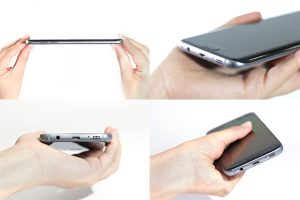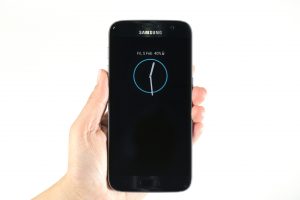The Samsung Galaxy S7 edge is here, and it’s come to the party with a high-end smartphone featuring great design, premium materials and impressive under-the-hood specs. Samsung with the S7 edge has done well to listen to its user base and improve on the flaws of the last year’s S6 edge. Today we put these two up against each other, and do a quick comparison to show how much really has changed in this new handset.
Display and Design

The S7 edge has a bigger 5.5-inch form factor and comes with a QHD Super AMOLED display with a pixel density of 534 ppi compared to the 5.1-inch QHD 577 ppi screen that we saw on the S6 edge. The display though not an upgrade in terms of resolution does come as a welcome upgrade when it comes to size. To Samsung’s credit, it has managed to cut down on the screen-to-body ratio and bring a bigger display to the S7 edge without adding significantly to the phone’s dimensions.
To Samsung’s credit, it has managed to cut down on the screen-to-body ratio and bring a bigger display to the S7 edge without adding significantly to the phone’s dimensions. The phone’s display also comes with an intelligent “Always-On” feature which figures out when the phone’s display is not face down on a surface or kept in a pocket and stays lit up to show important notifications and time.

The phone also comes with more rounded edges which combined with the rounded edges at the back provides for a far better grip to the user. Samsung claims it has “made the camera nearly level in the S7 edge which carries forward the premium glass and metal design scheme of the S6 edge while incorporating IP68 waterproofing, and dust resistance, capabilities which provides safety up to 30 minutes while submerged under 1.5 metres of water to this latest iteration by sealing the metal chassis of the phone from the inside.
Under-the-hood Specifications
The S7 edge is available in two versions with two different processors. The first will see a 64-bit octa-core (2.3GHz Quad + 1.6GHz Quad) processor, the other will come with a 64-bit quad-core (2.15GHz Dual + 1.6GHz Dual) processor. The device that makes it to India is expected to carry the Octa-Core Exynos 8890 SoC. This will be an upgrade over last year’s 1.5 Ghz Exynos 7420 Octa-core SoC present on the S6 edge.

The S7 edge also gets one up over the S6 edge when it comes to RAM on board. The S7 edge comes equipped with 4GB of RAM while, the S6 edge came only with 3GB on board. In terms of inbuilt memory, the S7 edge comes in only 32GB and 64GB options as compared to the S6 edge which had a 128GB variant too in its arsenal, but what makes the S7 edge a clear upgrade over the S6 edge is the fact that the former houses a microSD card slot for memory expansion.
Camera
Samsung pulling out of the Megapixel race has decided to jump into the fray with a ‘Dual-Pixel’ 12-megapixel camera at the back, and a 5-Megapixel front camera both with F1.7 aperture. Galaxy S6 edge on the other hand, came with a 16-megapixel rear camera with OIS and a 5-Megapixel front camera.
Samsung claims this is the most advanced camera to date that it has used on its phones and that the pixels in its camera are around 30 percent bigger than the competing phones such as the iPhone 6s Plus and thus allow for sharper, clearer pictures, even in low-light surroundings.
The company claims that the dual-pixel technology which it has incorporated works like a human eye and results into 100 percent of the pixels being used to focus allowing for a faster focus while taking a picture.
Battery & Gaming
Samsung S6 edge was notorious for it’s short battery life, and Samsung has looked to correct this basic flaw with a significantly bumped up battery pack in the S7 edge. The new phone features a 3600mAh battery pack, which is a cool 1000mAh over its predecessor.
The S7 edge also comes with new Air-Cooling tech to help keep the temperature of the phone down, and also adds to the mix wireless and fast charging capabilities. One thing that Samsung did miss out on was the widely expected USB Type-C port.
The mobile phone gaming market is emerging as an important space and Samsung is making a very strong push for it with the S7 edge. The S7 edge will be the first device to use the Vulkan API which Samsung claims will provide users the ability to experience PC-quality gaming on the S7 series devices with lower battery consumption. The company has also added a new ‘Game Launcher,’ to enable users to better manage
.jpg)
.jpg)

No comments :
Post a Comment